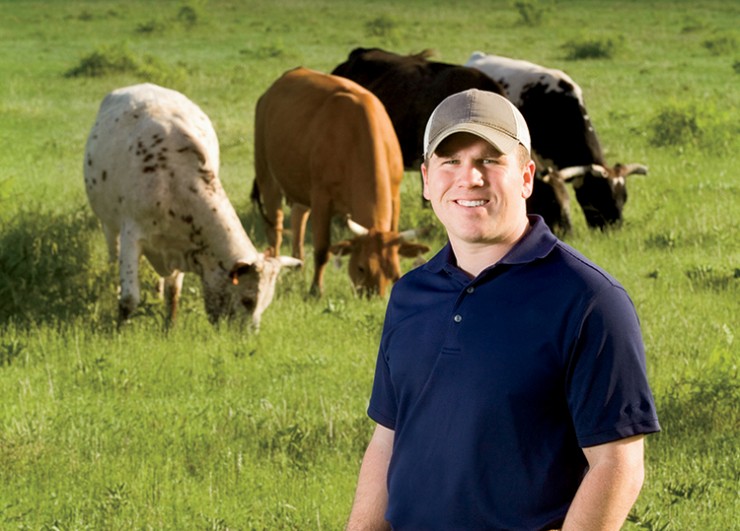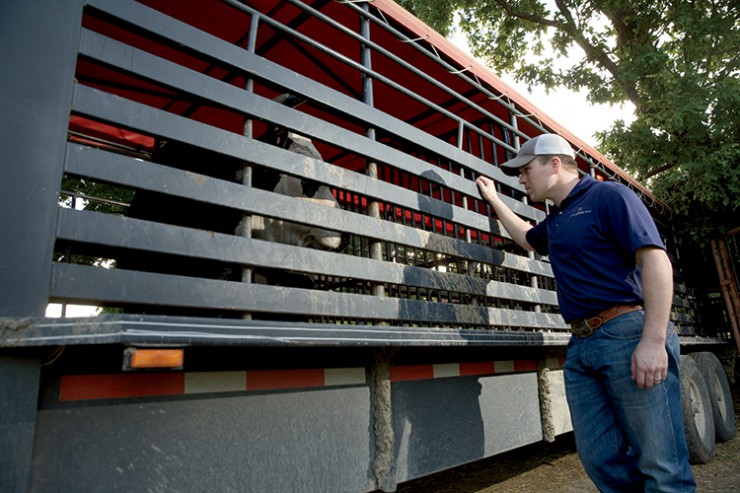Home > Texas > Texas Crops & Livestock > Farming for the Future of Texas
Farming for the Future of Texas
In partnership with: Texas Department of Agriculture

Passing the family farm down from generation to generation, once a given, is now far less common. Yet for some young Texas farming families, working the land and livestock are still passions deeply rooted in history, tradition and family.
The average age of the Texas farmer is 58, and only six percent of farmers are under the age of 35, according to the 2012 USDA Census of Agriculture. This aging trend has prompted the Texas Department of Agriculture and the Texas Farm Bureau to seek out young farmers like Sam Sparks of Harlingen and offer them the support and resources needed to succeed.
Sparks, 33, is a recipient of the Texas Farm Bureau’s Outstanding Young Farmer & Rancher Award. He and his wife, Shannon, operate a 10,000-acre farm where they grow sugarcane, cotton, corn, grain, sorghum and soybeans. The Sparks family also raise registered and commercial Brahman and Brangus cattle. A third-generation farmer, Sparks grew up working his father’s land.
“When I was just 5 or 6 years old, I can remember going out with my older cousins during harvest season to help my dad and uncle,” Sparks says. “Whether it was hoeing weeds or picking up cotton to take to the gin, I wanted to help.”
![Young Farmers [Infographic]](https://eadn-wc01-4177395.nxedge.io/wp-content/uploads/2014/08/Screen-Shot-2014-08-28-at-4.13.32-PM-740x335.png)
He says his parents welcomed his decision to join the family business, even though he “was never pushed in any direction.”
“They let me choose my own path, but they welcomed my decision because farming is in our blood. It’s our passion,” he says.
It’s a passion also shared by Jake Griggs, who operates a 1,000-acre ranch in Corsicana with his brother and father. The Griggs family raises rodeo cattle, with a focus on producing bucking bulls. Griggs grew up helping his father on their cattle ranch. He studied finance at Texas A&M University and received his degree in business administration. After a postgraduate stint as a banker, Griggs joined his dad and brother’s operation. He says his education helped him better understand how to make the business profitable.
“It’s all about using resources efficiently — whether it be money or seed,” Griggs says.

Griggs is a recipient of the Texas Department of Agriculture’s Young Farmer Grant program, which provides grants to young agriculture producers between the ages of 18 and 45 who are starting or expanding agricultural businesses in Texas. Rising to the challenge Griggs says young farmers face obstacles similar to those of their predecessors; take weather, for instance. He says his ranching operation has been significantly impacted by the recent drought.
However, Griggs also is quick to point out new technological advances that have helped overcome some of those hurdles. For example, he uses apps on his smartphone to measure the size of a pasture, determine how much seed to put out and how much fertilizer to spread. Still, of all the resources available, Griggs says the experience and wisdom passed down by older farmers and ranchers are the most valuable.
“Even though there have been many technological improvements, there’s a lot of proven techniques and experience from people who have been doing this for 50 or 60 years,” he says.
![Young Family Farmers [Infographic]](https://eadn-wc01-4177395.nxedge.io/wp-content/uploads/2014/08/Screen-Shot-2014-08-28-at-4.13.46-PM-740x331.png)
Cade Richmond agrees. He grows 450 acres of coastal Bermuda under irrigation, as well as 2,500 acres for cattle grazing and dry land farming in De Leon. Richmond says he worries that with the aging population of farmers and fewer young people entering the profession, this generational knowledge will disappear.
“It takes years of learning under the older generation,” Richmond says. “It’s nearly impossible to just start farming; the learning curve is too costly. My overall concern is that there are fewer and fewer of us. It’s a lot easier to go into town and work an 8-to-5, but for those of us who have the passion for agriculture and this way of life, it’s worth the hard work.” A passion for farming Richmond believes a significant hurdle for young farmers is the ability to secure startup capital, which can stretch into the hundreds of thousands of dollars. He credits Central Texas Farm Credit with “taking a chance on me” when other banks were leery. Sparks agrees that the barriers for entry into farming can be steep, but says many resources are available to help young Texas farmers succeed — from associations that provide education and networking opportunities to special loans to funding from sources like the Texas Department of Agriculture’s Young Farmer Grant program. “That’s the beauty of farming,” Sparks says. “We don’t compete against each other. We’re all here trying to produce the best product for the consumer. We help our neighbors, whether they’re across the street or across county lines.”



